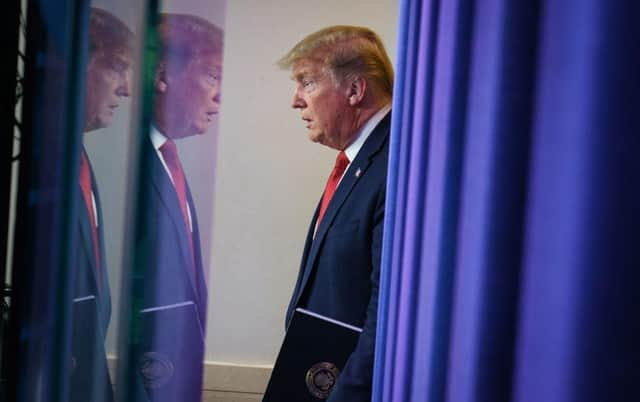Will the USA relax lockdown? What Trump is saying about coronavirus - and his plan for reopening US states


Donald Trump outlined his exit strategy, describing it as "a phased and deliberate approach" to restoring normal activity in areas that are seeing a decrease in Covid-19 cases.
Speaking at a daily press briefing on April 16 he said "We're starting our life again. We're starting rejuvenation of our economy again. This is a gradual process."
Advertisement
Hide AdAdvertisement
Hide AdThe measures are aimed at easing restrictions in areas with low transmission of the coronavirus, while holding the line in harder-hit locations.
Days after the president claimed that he had “total authority” over decisions a more diplomatic Trump claimed that Governors would be able to implement the measures at their own pace.
"You're going to call your own shots," Mr Trump told the governors in a conference call. "We're going to be standing alongside of you."
What do the measures look like?
States that are seeing a decline in infections and have strong testing in place can begin a three-phase gradual reopening of businesses and schools.
Phase one recommends strict social distancing for all people in public. Gatherings larger than 10 people are to be avoided, and non-essential travel is discouraged
Phase two encourages people to maximise social distancing and limit gatherings to no more than 50 people unless precautionary measures are taken. Travel could resume
Phase three envisions a return to normality for most Americans, with a focus on identification and isolation of any new infections
The guidelines also include general recommendations to businesses as they plan for potential reopenings, suggesting temperature-taking, rapid Covid-19 testing and widespread disinfection efforts in workplaces.
Advertisement
Hide AdAdvertisement
Hide AdTrump has said that some States are in good enough shape to implement phase one immediately.
Speaking on Thursday he said: "They will be able to go literally tomorrow. We have a very large number of states that want to get going and they're in very good shape. That's good with us, frankly."
The guidelines also recommend that states pass checkpoints that look at new cases, testing and surveillance data over the prior 14 days before advancing from one phase to another.
At the earliest, the guidelines suggest, some parts of the country could see a resumption in normal commerce and social gatherings after a month of evaluating whether easing up on restrictions has led to a resurgence in virus cases. In other parts of the country, or if virus cases pick up, it could be substantially longer.
How have the measures been received by governors?
Governors of both parties have reacted to the measures with caution.
Delaware governor John Carney, a Democrat, said the guidelines "seem to make sense".
"We're days, maybe weeks away from the starting line and then you have to have 14 days of declining cases, of declining symptoms and hospital capacity that exists in case you have a rebound," he said.
West Virginia's Jim Justice, a Trump ally, cautiously floated the idea of reopening parts of the state, but said testing capacity and contact tracing would need to be considerably ramped up before restrictions could be safely lifted.
Advertisement
Hide AdAdvertisement
Hide Ad"All would be forgotten very quickly if we moved into a stage quicker than we should, and then we got into a situation where we had people dying like flies," he told reporters.
Coronavirus: The Facts
COVID-19 is a respiratory illness that can affect lungs and airways. It is caused by a virus called coronavirus and is spread primarily through droplets generated when an infected person coughs or sneezes, or through droplets of saliva or discharge from the nose.
What are the symptoms?
The NHS states that you should not leave the home if you have either:
• a high temperature – this means you feel hot to touch on your chest or back (you do not need to measure your temperature)
• a new, continuous cough – this means coughing a lot for more than an hour, or 3 or more coughing episodes in 24 hours (if you usually have a cough, it may be worse than usual)
What should I do if I feel unwell?
Don’t go to your GP but instead look online at the coronavirus service that can tell you if you need medical help and what to do next. Only call 111 if you cannot get help online.
What precautions can be taken?
Washing your hands with soap and water thoroughly. The NHS also advises to cover your mouth and nose with a tissue or your sleeve (not your hands) when you cough or sneeze; put used tissues in the bin immediately and try to avoid close contact with people who are unwell. Also avoiding touching eyes, nose and mouth unless your hands are clean.
When can I go outside?
The Government has put the UK into lockdown and instructed everyone to stay at home. You should only leave your home for very limited purposes:
Advertisement
Hide AdAdvertisement
Hide Ad• shopping for basic necessities, for example food and medicine, which must be as infrequent as possible
• one form of exercise a day, for example a run, walk, or cycle – alone or with members of your household
• any medical need, including to donate blood, avoid or escape risk of injury or harm, or to provide care or to help a vulnerable person
• travelling for work purposes, but only where you cannot work from home
However, these reasons are exceptions – even when doing these activities, you should be minimising time spent outside of the home and ensuring you are 2 metres apart from anyone outside of your household.